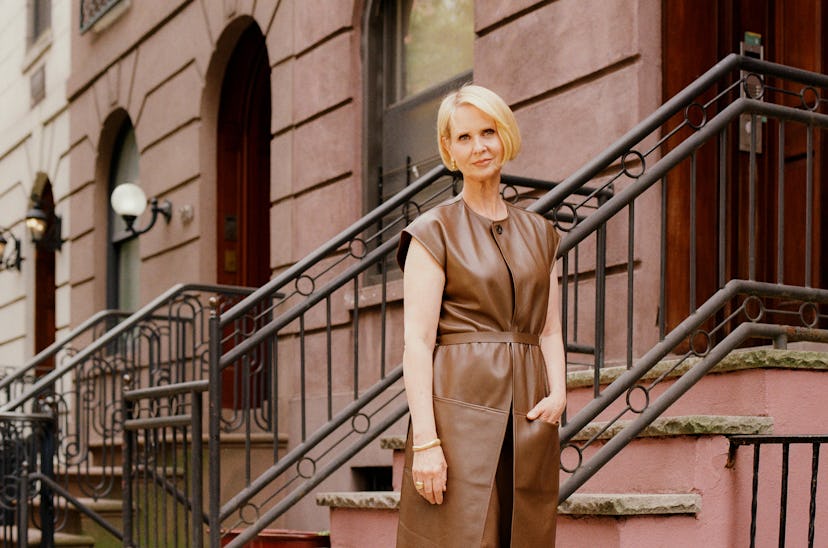Bustle Exclusive
It’s A Cynthia Nixon Summer
The actor opens up about starring in two of the season’s buzziest shows.

At the beginning of And Just Like That..., the Sex and the City women — including Cynthia Nixon’s Miranda — come to Carrie’s aid as she’s newly widowed. Now, in The Gilded Age, it’s Nixon’s character who’s forced to pick up the pieces after her husband’s death.
Season 3 of HBO’s period drama sees Ada in “a whole new light,” Nixon, 59, tells Bustle. While still grieving, Ada is thrust into a new role as the head of the household after inheriting an unexpected fortune from her late husband. The money was a godsend for Ada and her older sister, Agnes (Christine Baranski) — but the cheerful socialite isn’t exactly a natural-born leader.
“She is very childlike in a lot of ways, and all of a sudden, she has all this power and responsibility,” Nixon says. “She's also deeply in mourning for the loss of her beloved husband. So she's both trying to fill the tremendous void of the loss of him, and also trying to, for the first time in her life, be the boss, not only of herself but of a whole household of people.”
That creates tension between her and Agnes, who isn’t eager to play second fiddle to her little sister. And the series has fun with the duo, letting them clash while still supporting each other. Their playful bickering and searing one-liners are endlessly fun to watch.
It helps that Nixon and Baranski have worked together and known each other for over 40 years. “It’s nice when you get to play opposite someone with whom you have so much built-in affection,” she says. “It makes your job so much easier. And as Christine says, intimacy is one of the hardest things to fake as an actor, so we really started ahead of the game.”
Below, Nixon opens up about The Gilded Age, working with Baranski, and what makes Ada and Miranda such great characters.
One of the most moving parts of the season was watching Ada deal with her grief. What was the most challenging, or even surprising, part of playing that aspect of her journey?
Ada is a person who strives so much in life to be cheerful, not to complain, and not to be a burden. I guess the [challenging] thing was shooting [And Just Like That] at the same time, which made it harder to try and carry Ada's grief with me.
Do you think Ada is the type of person who would want to find love again down the line?
I don't think so. She can't quite believe her good fortune having found someone to love and to love her back. That was such a deep and profound love. I think that she will be married to the Reverend Forte until her death. She could not even imagine looking at anybody else, honestly.
Ada’s other meaningful relationship is with her sister, Agnes. How do you and Baranski spend your time together on set?
My goodness. We're both very up on current events. We spend a lot of time talking about the state of the world, and then we do a lot of reminiscing, not just about our shared history, but about past performances that we've seen, and people we've known. We've both been in this business for a very long time. So, we have a lot of history, both separately and together.
Ada takes on some societal causes during the season. As someone who uses their platform to support different causes, albeit different than Ada’s, what parts of yourself influence your portrayal of this character?
Ada is very optimistic and very cheerful, and I am those things. In contrast to Miranda, Ada is a person who centers herself not on her work — because she does not have work, per se — but on her interpersonal relations. My work is very important to me, but I am very deeply centered in not just my family, but also my deep, good friends I've known all my life. In that way, I'm very [much] like Ada.
Speaking of Miranda, And Just Like That is also airing its new season, which is also about well-to-do women in New York City. Obviously, the shows are wildly different, but what similarities do you think they share?
There's also a lot of female rivalry in [The Gilded Age]. Female rivalry is not a big theme in And Just Like That, but there is a lot of sisterhood and solidarity in both shows. In terms of [Ada and Miranda], they have very little in common, except perhaps that both of them are shunning alcohol at the moment.
It's rare for an actor to play the same character for over 20 years. Have you ever been in a position where you suggested ideas for Miranda or her storyline?
No, it doesn't work that way. Our writers are so talented, and I honestly never try to imagine what would happen to Miranda. Even if I did, I'm sure that anything I would think of would pale in comparison to what our writers think of.
The thing that excites me about both shows is that our teams of writers are very good at putting their characters in new situations. The mark of a not great television series is [characters] who find a formula. This person always does this and it's always funny, or this person always does this and it's always touching, and then they just slightly change a few of the details, and just have the character do that same thing over and over and over. But in both shows, they let these women evolve, age, grow, and have victories and defeats. They take these women into places, not only where the audience hasn't seen them go before, but where they've never been.
This interview was edited and condensed for clarity.